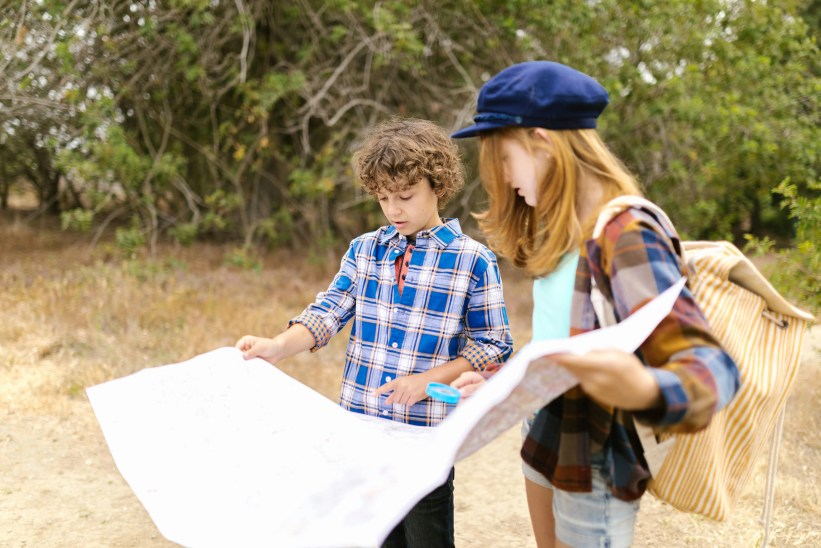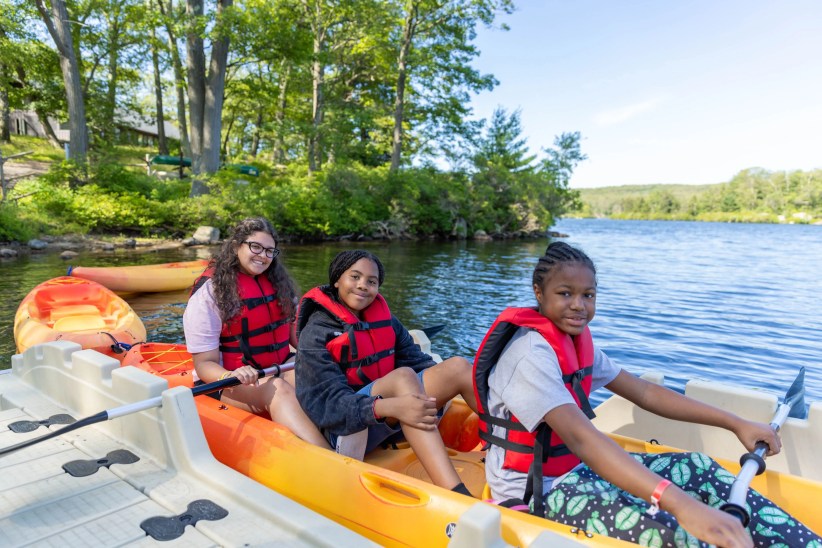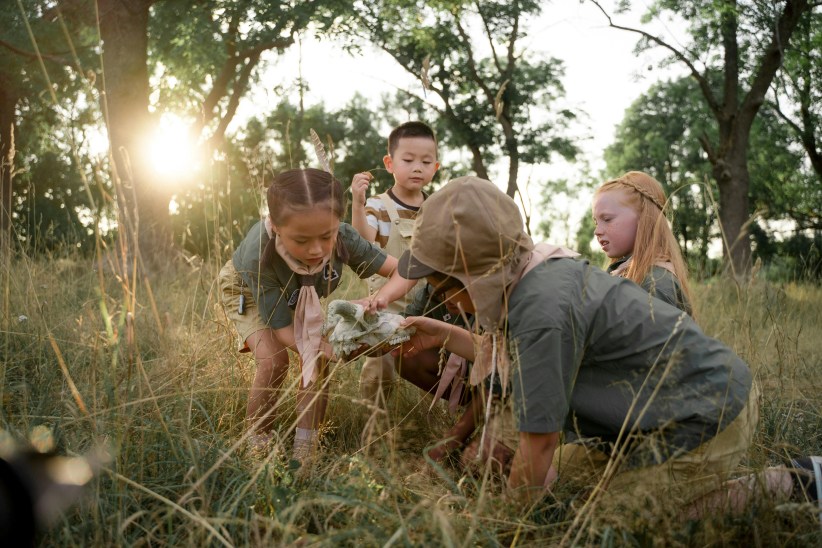
Are you looking for a day or overnight camp for the first time? Not sure how to begin your search? Try not to let yourself get overwhelmed by the process of choosing a camp. We’ve spoken to some camp professionals to help you research and find the right camp for your child.
Advice For Every Kind Of Camp
Philosophy and mission: Each camp has its own mission and philosophy. Parents want to make sure the camp they are choosing has a philosophy that reinforces their own family’s values.
Camp director: Getting to know the camp director before signing up for camp is one of the best ways to get a feel for how the camp will run. Genna Singer, director of camps at JCC Manhattan says: “Have a real conversation with the camp director. Whether it’s sharing your hopes and goals for your child’s summer or getting a true understanding of the camp’s mission and how they carry it out, these conversations will help you understand what the camp is truly about.” Jason Sebell, director of camps Kenwood and Evergreen, overnight brother-sister camps in Wilmot, NH, adds: “We want parents to look for a partnership with the leadership team. When parents get a letter home about their child being unhappy about something, we want parents to know they can contact us and ask us how we can help their child overcome this. If we find a child is having a hard time, we can say to parents we see this challenge and here is how we can partner together to get them to grow beyond this.”
Consider your child: While you may be excited about the camp experience for your child and certain aspects of different camp programs, make sure to step back and consider who your child is and if the program is the right fit for your child. “I tell parents [that] it can be helpful to ask the director about the child who doesn’t thrive at the camp. No camp fits every family and child. Knowing who isn’t successful at a particular camp may give you a window into how this may or may not work for your child,” Sebell says.
Think about what you want your child to gain: “Parents should figure out what their priorities are and what are the outcomes that are most important for their child’s camp experience,” Sebell says. “Prioritizing what you want is very important. While you might start off looking for a camp that has a pool or smaller bunks, a camp that feels right to you may not have those things or every other bell and whistle on your list. When researching a camp, you should get the sense that the staff knows your child’s needs and who they are. This is more important than if the camp has soft serve ice cream in the dining hall. ” Singer adds: “Parents looking for camp for the first time should understand the difference between school and camp. School is focused on academics where at camp, we focus on the social and emotional development of a child. The things you look for are not necessarily the outcomes of what a child will learn, but rather how they will feel.”
Program: Parents should ask about the camp program and what activities the camp offers. Think about what your “must have” activities are for your child and make sure the camp offers them. Be sure to ask about the program for your child’s current age as well as in the years to come. “Ask what a typical day is like at camp and what activities children participate in,” says Rachel Max, director of Shibley Day Camp in Roslyn Heights, NY. “For day camp, make sure to ask about the swim program. Find out what type of swim instruction is offered, how many times a day children swim and who the instructors are.”
Enrollment options: Think about whether you are looking for a full season camp or session camp for overnight camp. For day camp, are you looking for a few weeks of camp or the entire summer? Does your family need before and after care for day camp and if so, is transportation provided?
Staff composition: Inquire about the age of the staff, their experience, pre-season and on-going staff trainings, background checks, the interview process, camper to staff ratios and supervision in cabins and various activities. At a minimum, camp staff should be trained in safety regulations, emergency procedures, communication, behavior management techniques, appropriate staff and camper behavior, and specific procedures for supervision.
Safety and outside review: Ask about what safety measures are in place at the camp you are interested in. These can include inquiring about medical personnel on property, emergency plans, staff screening procedures and instructor qualifications. You also want to ask if the camp is inspected each summer by the Department of Health and ask if the camp follows the nationally known accreditation process of the American Camp Association. “Many parents aren’t aware that there is a good housekeeping seal of approval for summer camps—being accredited by the American Camp Association,” Singer notes. “Ask if the camp is accredited and has gone through the standards and practices of our industry.”
[gravityform id=”17″ title=”false” description=”false” ajax=”true”]
Advice For Overnight Camps
Co-ed/single-sex/brother-sister: When choosing an overnight camp, consider if choosing a coed, brother-sister or single sex camp is a deciding factor for you. Consider the differences between these types of camps when doing your research. Sebell says: “Every camp defines itself differently. If you want your child to form healthy social connections with children of the other gender, don’t ask if the camp is single sex, coed or brother-sister. Instead, ask how boys and girls spend time together and what the objectives for those social interactions. Asking about the practices and outcomes are really important and more helpful then asking how they designate themselves.”
Advice For Day Camps
Bussing: Consider if you are looking for a camp down the block or a bus ride away. There are quality camp programs both in New York City and out in the suburbs. Often times, parents worry about their children taking a bus to a camp outside of the city. Singer offers parents the following advice: “Think of children as capable human beings who usually are able to rise to the occasion. Our job as adults is to support them and say they can do it. City children often don’t take bus to school or travel on their own without their parent or another adult. Taking the bus to camp can be a great opportunity to stretch a different muscle and try something they haven’t done. If you are worried, ask the director how they help a child who is nervous about the bus, are there activities to keep them engaged and how they prep bus counselors for a child that is nervous.”
Best Way to Research a Camp
There are many ways to research a camp. Sebell says: “Parents put this pressure on themselves that they haven’t picked a camp at the right time of year. If parents are open to meeting with the camp leadership and sharing their values and what is important to them in a camp, choosing a camp can be done 12 months of the year.”
Camp fairs: Camp fairs are free events that bring dozens of camps straight to parents, allowing parents to have one-on-one conversations with many camp directors to find out about their camp program. It can be a great way to find out about a few camps all within a short period of time. Click HERE for the full schedule of New York Family’s Camp Fairs this season.
Call the American Camp Association (ACA): Not sure where to begin your search? Parents can call Renee Flax (212-391-5208) at the ACA for free, one-on-one advice. Flax will talk to you about your child, what you are looking for in a camp, and offer you a couple of suggestions on camps that would be a good fit for your family.
Touring: When possible, tour the camp or camps you are interested in. Touring during the summer gives families a chance to see camp in action with campers enjoying all the fun activities. A tour also gives you a chance to ask the camp leadership questions while you are in the camp environment. If you aren’t able to tour over the summer, many day camps offer tours in the off season. This will give families a chance to see the facilities and meet the camp director. “We are open all year, so if a family can’t tour during the summer, they can come when it’s good for them,” Max says. “We also do events in the winter once a month at camp for current and prospective families. These days become nice opportunities for families to see the camp, meet the staff and have a just have a great time at camp.”
Rookie Days: There are many overnight camps that offer Rookie Days or Rookie Weekends which are designed to give future campers a chance to experience the camp in session by joining in on the camp activities before going to camp. While children enjoy the camp activities, parents are taken on a tour of the camp. Rookie days are wonderful ways for children and their parents to get a feel for what the camp is like and to determine if the camp is the right fit.
Spring and fall festivals: Max says: “Fall and spring days at camp give families a good feel for the camp and the other families who are part of the camp community. Parents get to see that their child is enjoying activities and feeling comfortable in a new environment.”
Home Visits: “I often get phone calls at the end of August or early September with parents saying they are late to the game by looking at camp now,” Sebell says. “I feel badly that they are getting this message from friends or family. Any time of year is the right time to be introduced to a summer camp. We like when families come for a tour but we are happy to do a home visit. While some children thrive walking around and getting a sense of the community that way, for some that’s intimidating. It can be more relaxing for them if a camp professional comes to their home turf and talks about camp at their kitchen table.”
Talk to friends and neighbors: It’s great to ask friends where their children go to camp but keep in mind each child is different and while one camp may be good for that child, it might not be the best fit for others. “Talk to one or two good friends you feel connected with and use them as starting points to begin your research. Don’t survey the playground and every family your child is friends with,” Singer says. When looking for an overnight camp, Sebell offers the following guidance: “It is easy to look at camps that your friends are sending their children to, but one size doesn’t fit all. Looking at one or two camps that your friends’ child goes to can be helpful but there are often other camps that may be a better fit for the outcomes you want for your child. I recommend looking at no more than four camps with two of them outside of your social circle’s knowledge and that are all different. You may discover that one of those other camps does things so differently that it resonates with you.”




















